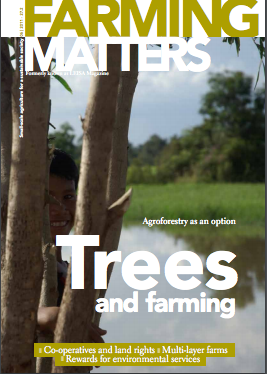Making markets work for the poor is all about connecting small-scale farmers to niche export markets. Or is it? Participants at the provocation seminar “Making markets work for the poor: Contents and discontents”, held in Paris on 30 March, called on development agencies to turn their eyes away from export markets and take a closer look at local ones.
The idea behind focusing on export markets is that building direct links between smallholders and big business can cut out the middle man and deliver better prices to farmers.
The trouble with exports
But too often, this approach ignores the important role that many products play in local economies. Speaking at the provocation, Harm van Oudenhoven, coordinator of the Tropical Commodity Coalition, said that in Nicaragua, nongovernmental organisations (NGOs) have put huge efforts into stimulating the production of quality cacao by connecting farmer cooperatives to large foreign companies.
“It seemed that if cacao could be produced by farmers and exported at a reasonable price, development goals would be achieved,” he said. But what about local markets? Cacao has played an essential role in the local economy for more than a thousand years, said Van Oudenhoven. “Millions of people drink cacaobased drinks and yet I know of no NGO putting time and effort into improving the cacao production for use in local drinks.”
Van Oudenhoven argued that it would make more sense to focus on improving local production, local knowledge and local markets before looking to regional or international opportunities. His point was echoed by several participants, including fellow speaker Roger Blein from Bureau Issala, who said “Before conquering world markets, we need to focus on regional and local ones.” One online participant suggested that a progressive approach — starting with local markets then moving up to regional, national and finally export ones — would also help farmers reduce risk.
Julienne Brabet from Université Paris Est Créteil raised an important question, asking “if we don’t start with local development and go straight for an exportdriven economy, will we miss the target of alleviating poverty?”
Van Oudenhoven’s answer: yes — linking to export markets may be positive for some farmers but not for all. “The coffee sector in Nicaragua has been helped quite a lot by NGOs, which is fine, but other sectors are still struggling with the same problems they were facing 20 years ago.”
Other local actors lose out too. “With an international business dominating the local market the development of local traders is by-passed, the higher quality produce is exported leaving local producers with the inferior product and often with a shortage,” said van Oudenhoven.
Jérôme Coste, director of the Institut de Recherches et d’Applications des Méthodes de développement (IRAM) agreed, adding that in his experience, a focus on exports can, in some cases, also increase socio-economic inequalities at the local level.
Partly this is because, as noted by one online participant, when you start getting involved with big business — even for Fairtrade products — attention is focused only on price and other key aspects of making markets work for the poor, such as capacity building, fall by the wayside.
The hard path
A focus on exports has big implications for food security too, according to Blein. This is because it acts as a disinvestment in the food sector. The result is that agricultural areas of Western and Central Africa — where 70 per cent of the population is involved in agriculture — now find they have a negative balance of food despite being large exporters, still reliant on imports to meet demand for staple foods such as rice, milk and meat.
Blein argued that the development of value chains would have more impact if we respected staple food crops. Earnan O’Cleirigh, from the OECD’s Development Assistance Committee agreed, arguing that the problem is that development agencies and NGOs tend to focus on markets based on commercial opportunities rather than picking markets that are important for the poor and on which they base their livelihoods. For many people in sub-Saharan Africa, these are basic food crop markets — rice, cassava, sorghum, millet and banana, for example.
So why don’t we focus on these local markets? It’s largely because they are difficult. “They don’t link easily into export markets except regionally, they don’t have big commercial opportunities and they work very inefficiently,” O’Cleirigh said.
It seems that development actors too often seek out interventions that will be seen to be successful. But if we are to really make markets work for the poor, perhaps we must start choosing the hard path.
More information
To find out more about the provocations visit www.iied.org/provocations, where you can also find links to watch past seminars on producer agency, on “rights versus markets” and on making markets work for smallholders.
Text: Sian Lewis

